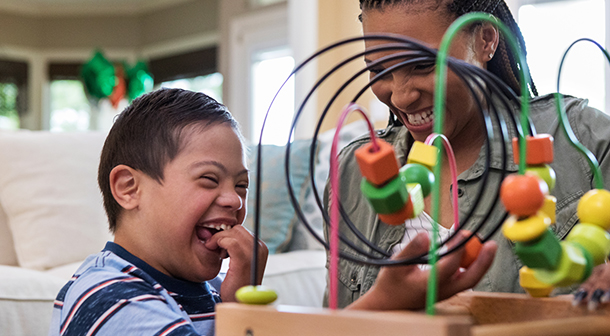Special Care for Special Kids
By GetParentingTips.com staff
Read Time: 8 Minutes
Parenting a child with special needs brings challenges and changes to your family, but you are not alone in confronting them. There are resources and support systems that can help you navigate the ups and downs of caring for a child with special needs.
Special needs is a general term that describes children who have a chronic health condition or disability that may be physical, medical, developmental, emotional, behavioral, or psychological. Children with special needs may have conditions ranging from autism spectrum disorder to ADHD, multiple sclerosis, Down syndrome, bipolar disorder, dyslexia, or any of dozens of other disorders. Some conditions are present when a child is born while others develop later. Some children have severe limitations and need constant care; others are more self-sufficient. The amount of care can depend on whether a child has cognitive disabilities, physical disabilities, or both.
Parents of children with special needs have many responsibilities, including managing medications, treatments, and therapies. This can add extra stress to already busy daily lives and make it harder to care for the entire family. Establishing a daily routine can be a real challenge because every day often brings a different one. With these challenges come lots of joys in parenting a child with special needs. Be gentle with yourself when challenges seem overwhelming. Take time out to celebrate these special moments.
Parenting is a job that must be learned, and parenting a child with special needs means there's even more to learn. Allow yourself to make mistakes and give yourself credit for all the progress you make.

Parenting Tips
Every child is different, and every family is unique. Your journey won't be the same as anyone else's, but there are things all parents can do to help their children grow and develop. Below are some basics that can help your child whether or not she (or he) has special needs.
- Every child has strengths, interests, and skills that you can celebrate and promote. One of the joys of parenthood is helping children find and develop their interests. Give your child the chance to try different activities and pay attention to what catches her interest. If she loves puppies, for example, you can tell her stories and sing songs about dogs, help her learn the names of different kinds of dogs, color pictures of dogs, or get creative and play like you are puppies. Help her discover the things she loves to help her learn and grow.
- It's not always easy, but try to avoid comparing your child to other children. No two children are the same.
- Praise her every day. Children love to know when they've done something right. Compliment the behavior you want to encourage. "I love how you were patient while I put the groceries away." "Thank you for using your words when you needed me." "You did a great job showing me the clothes you want to wear today."
- Be patient with yourself and her when things don't go right. Remember, you are both learning and doing the best you can. If you try something that doesn't work for her, make a mental note and try something different next time.
- Keep a sense of humor and a positive attitude. Children learn a lot from how their parents handle difficult situations. Even though it's hard to stay calm and positive when things go wrong, you are teaching valuable lessons about how to get through life.

Build a Support Network
Parenting is easier when you connect with others who understand what you are going through. Other parents who have special needs children can be a wonderful resource. Online communities can connect you with parents who can offer support and advice. Here are two sites that can help you get started:
Having a child with special needs puts extra stress on the entire family, especially parents. It's important for you to be able to talk to someone who understands your emotions and can listen and provide support without judging you. It may be a friend, family member, health-care provider, or therapist. Whether you meet face to face or chat online, you will feel better having someone to turn to.
Need parenting help now?
The Texas Parent Helpline is available 24/7.
- Call 833-680-0611
- Chat with us
- Text 833-680-0611
Find Ways to Have Family Fun
First and foremost, children with special needs are children. Just like all kids, they need to enjoy themselves. So be on the lookout for fun, silly, interesting activities that suit their interests and abilities.
Here are some suggestions for how to get the most from your recreational outings.
- Look for fun opportunities that are nearby, such as an accessible park, children's museum, story time at the public library, kid-friendly restaurant, or art or dance class. The less time you spend traveling the more time you can spend on the activity.
- Plan ahead for your outing. For example, make sure your destination has convenient parking and accessible facilities. Gather up all the snacks, medications, and supplies you may need and pack them in a bag you can carry. It's better to be over-prepared than under-prepared.
- Go with friends who understand your family's needs. Children with special needs love playing with friends as much as other kids, but they also need flexibility and understanding. Try meeting friends at your destination in case you need to leave before they are ready.
- Be flexible and leave early if you need to. If your child gets tired, overwhelmed, or stops having fun, it's time to leave. Don't blame yourself or your child if the outing doesn't last long. You can always try again another day.
- Try to stay in the moment and enjoy the fun you are having.
- If your child depends on structure or routine, make a plan for your outing and discuss it ahead of time. Like all kids, children with special needs feel safer and more secure when they know what to expect.

Tips for Helping Brothers and Sisters
Having a child with special needs affects the whole family, including siblings. Growing up with a brother or sister who has special needs has both benefits and challenges. Siblings may develop a greater understanding and compassion for what it means to have a disability or other challenge. They may also feel jealous about how much time and attention their sibling gets from their parents.
As a parent, you may not be able to devote the same amount of time and attention to each child, but there are ways to help all your children feel loved and appreciated.
- Set aside time for each child so they don't have to share your attention with anyone else. You could plan an outing or special time at home to enjoy activities. For example, you might go out for ice cream or have arts and crafts time at home. Try to put away your mobile device and all other distractions so you can give full attention your child for a little while. At the end of the activity, hug her and let her know you enjoyed spending time together and look forward to the next time.
- Let younger siblings help as much as they can, such as bringing you things or sharing a toy or book with their sibling. Complimenting their contributions and telling them how much you appreciate their help will make them feel valued.
- Allow older siblings to help on their own terms, perhaps as cheerleaders and advocates for their brother or sister. Letting older kids choose some ways to be involved helps them develop independence and strengthens their bond with their sibling with special needs.
- Be a role model for patience. Just like your kids, you probably feel frustrated and overwhelmed at times. You can teach them powerful lessons by staying calm and in control in difficult moments. Taking care of yourself and having ways to deal with stress are key.
Take Care of Yourself
Caring for a child with special needs can be exhausting. It's easy to neglect yourself because there is so much that needs to be done. Paying attention to your own well-being will help you feel less tired and impatient. And taking care of yourself doesn't have to take a lot of time, but it does take some planning. Here are some ways to work wellness into your daily routine.
Physical care
- Eat a nutritious diet that includes energy-boosting foods such as oatmeal, spinach, sweet potatoes, eggs, bananas, and other fruits.
- Get 7 to 9 hours of sleep a night. Try to go to bed at the same time each night and get up at the same time each morning, even on weekends.
- Drink water throughout the day to stay hydrated and energetic. There's no one-size-fits-all rule about how much you should drink. In general, drink enough water so that you rarely get thirsty and you should be fine.
- Aim for 30 minutes of exercise a day to replenish your energy and reduce stress. Ideally, your daily exercise should include aerobic activity like walking as well as strength training like weight lifting.
Emotional care
- Stay in touch with your support group that includes a trusted friend, family member, health-care provider, or therapist.
- Take a week off from self-criticism. Think only kind thoughts about yourself and congratulate yourself for making it through each day.
- Each day write down something great you did or something you feel good about.
- Plan an outing. It can be something solitary like a walk or social like eating at a favorite restaurant. Take some time out for you.
Mental care
- Cultivate your own interests separate from your role as a parent or caregiver.
- Depending on your preferences, read a book, watch a video or movie, or investigate a new hobby or skill. The point is to remind yourself that there's more to your life than being a parent.
- Writing in a journal can be therapeutic, even if it's just a jotting down a few thoughts each day.
Spiritual care
- Begin each day by meditating or reflecting on what you are grateful for, even if it happens while you are in the shower, brushing your teeth, or getting dressed.
- Consider starting a "blessings book" that you can refer to when times are tough.
- Challenge yourself to get involved in a worthy cause you care about. Your involvement can be simple, like saving up spare change to donate, but can help you stay connected to the world outside your home.
Parenting a child with special needs takes time, energy, dedication, and lots of help. Try to be patient with yourself and your child and give yourself credit for meeting the challenges of each day. If you are struggling, talk to your doctor about programs that may be able to help. Remember, you don't have to do it alone!


